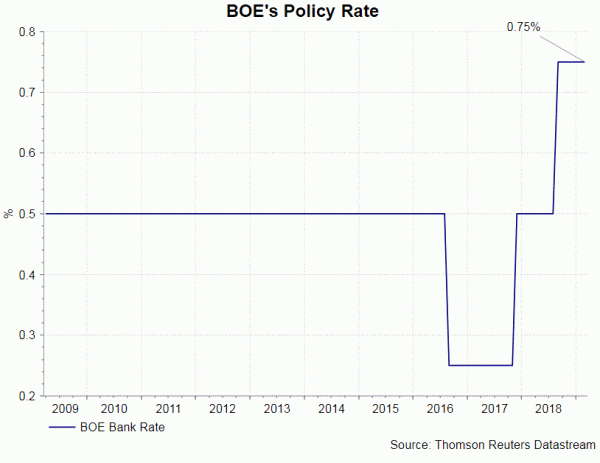BOE would leave the Bank rate at 0.75% in March. Despite the bounce in the January data, the members would still remain cautious as global economic slowdown remains a key theme of this year. Meanwhile, the members would maintain a cautious outlook over Brexit uncertainty, especially the UK parliament has voted for an extension of Article 50 last week.
Since the February meeting, economic data were mixed. GDP growth recovered to +1.4% y/y in January, from a weak +1% in December. On quarterly basis, GDP growth decelerated to +0.2% in 4Q18, from +0.6% in the prior quarter. On the job market, the number of jobs soared +222K in the three months through January, beating consensus of +120K and December’s +167K addition. The unemployment rate slipped -0.1 percentage point to 3.9% during the period. However, the Claimant count unemployment increased +27K in February, while the January figure was revised higher to 15.7K. On inflation, the January report showed that the headline CPI eased sharply to +1.8% y/y from +2.1% in the prior month. Core CPI steadied at +1.9%. As the upcoming February data are expected to show no change from a month ago, current inflation level should give the central bank room to stand on the sideline.
The Brexit drama continues. Last week, following the defeat of the revised version of the Withdrawal Agreement (the deal), the UK parliament rejected with majority to leave the EU with no deal. Meanwhile, the MPs approved to extend Article 50, delaying the official Brexit date from March 29. However, the next step is highly uncertain with regard to the duration of the extension and what the government would do during the period of extension. House of Commons speaker John Bercow has just blocked a third “meaningful vote” on “substantially the same” motion as MPs rejected last week. PM Theresa May initially attempted to put the deal to the vote again this week, after which the duration of the extension would be decided. Her attempt was premised on the speculations that some Eurosceptic PMs would eventually support the deal in order to avoid a prolonged extension of Article 50.
At the February meeting, the central bank reiterated a tightening monetary bias and noted that any rate hike would only take place after “the fog of Brexit” is clear. We expect it would reaffirmed this stance this month. Delaying the time for leaving the EU means prolonging the uncertainty. This has already been hurting consumer confidence and business investment. The chart below shows that business investment has been falling after reaching a peak in 4Q17. Meanwhile, the number of working hours has been increasing steadily. This probably reflected the decision that corporations have become more cautious in capital investment due to Brexit uncertainty. the productivity is then replaced by higher labor force which could be reduced in a more timely basis. Despite a mild recovery in January, consumer confidence has remained negative and at the lowest level since 2014. Apparently, a strong employment market has failed to restored sentiment.


 Signal2forex.com - Best Forex robots and signals
Signal2forex.com - Best Forex robots and signals




